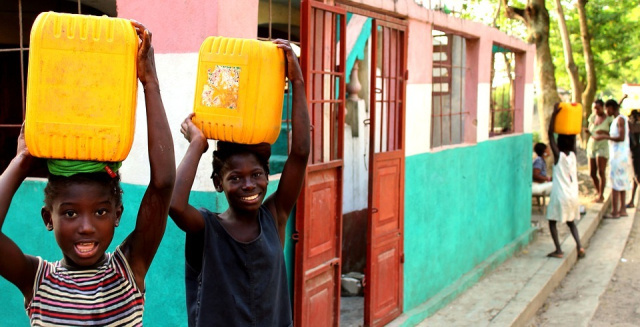
The following is a letter from Dr. Samuel Abelson, an emergency medicine physician who lives in Minneapolis.
Four years ago, Project Medishare began teaching point-of-care ultrasound to the staff at Hospital Bernard Mevs in Port Au Prince. Through the Sonosite Global Health programme, we have borrowed multiple loaner machines to use in teaching.
In 2016, Project Medishare was able to purchase a discounted M-Turbo through Sonosite SoundCaring and bring it to Haiti. This past spring, we once again were able to donate two M-Turbo ultrasound machines to the ICU/PICU staff at Hospital Bernard Mevs, and to the OB department in Marie Cherie Health Centre in Marmont.
This is a report about my latest trip to Haiti, which took place this this spring.
Fast results, immediate impact with POCUS
Sometimes, it is the simplest things can make a tremendous difference. I began my journey to help the Haitian people in November of 2010. At the time, there were no Haitian physicians able to staff the ER at Hospital Bernard Mevs in Port Au Prince.
Today, it is staffed 24/7 with Haitian physicians.
On this most recent trip to Haiti, we delivered a donated machine to Hospital Bernard Mevs before we attended the OB clinic in the countryside.
When we returned to Port Au Prince 3 days later, the ER physician (had trained on the M-Turbo on one of our prior visits) told us about a 29 year-old patient who had arrived in the interim with a gunshot wound to the abdomen. She performed a FAST exam, saw free fluid, and the patient was in the OR in less than an hour. He survived, in large part because of the M-Turbo.
Examples like this are what push me to return to Haiti to teach point-of-care ultrasound skills.
Enthusiasm for highly usable machines
Project Medishare arrived at an obstetrics clinic in rural Haiti to present them with the second M-Turbo. We wondered if these practitioners could learn to use the ultrasound effectively and influence the high rate of maternal and infant mortality.
Was the process too complicated to learn in just a few days of lessons?
We immediately began teaching obstetric point-of-care ultrasound, and it was amazing to see their excitement.
The grateful staff made it clear that, just by virtue of having ultrasound available in this rural setting, more women would come to the clinic, and more births would occur in a supervised medical setting. In a country where the infant mortality rate is 10 times that of the US, and less than 1/3 of Haitian births occur in with any medical assistance, it is clear there was a desperate need for this technology.
In addition to saving lives, it is incredibly gratifying to see the excitement of the Haitian providers as they learn to use POCUS. They know that they are being trained on state-of-the-art equipment that is virtually non-existent in most of Haiti. The excitement is palpable in the room as we teach, and often, staff would stay well into the evening, long past the end of their shift, just to learn as much as possible.
Patients in the OB clinic waited 5-6 hours just to get to see the ultrasound of their babies.
Sometimes, it is easy to lose sight of the profound effects that good medical care can provide; and then you see the appreciation of the people who are affected by it. The effects of these donated M-Turbo ultrasound machines have been immediate, profound, and impactful. Lives have already been saved, and countless more lives will be saved. It’s why Project Medishare is committed to continuing our twice-annual trips to Haiti.
Your Global Health and SoundCaring programmes are having a tremendous impact around the world. On behalf of Project Medishare, and its affiliates in Thomonde and Port Au Prince, please accept our heartfelt thanks for your support of medical care in all parts of the developing world.
Mesi anpil ("thank you very much" in Haitian Creole),
Sam Abelson, MD


